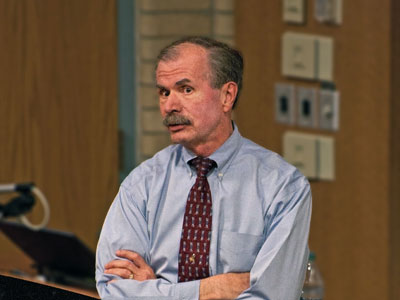“I’m in a very sad time now, as I look at what’s going on in this world. I’m sick to my stomach. Maybe it’s my fault too. Maybe I sat on my duff after I left NASA… Maybe some of you need to get off your duffs,” mused former shuttle astronaut Dale Gardner about the state of the space program. He presented to the Mines campus a passionate argument for future human exploration combined with a lighthearted look back at his experiences in the Shuttle program.
Gardner, a retired US Navy captain, holds a degree in Engineering Physics from the University of Illinois. He participated in two shuttle missions – STS-8 on Challenger in August, 1983, and STS-51A on Discovery in November, 1984. He was also scheduled to participate in a mission launched from Vandenburg Air Force Base in California, but the mission was canceled after the Challenger disaster. Gardner is currently the assistant laboratory director at NREL and a resident of Golden.
Gardner told a few amusing stories about practical life in space. One difficult aspect of space flight is adjusting to the gravitational differences and the resulting changes in motion. For the first twenty-four to thirty-six hours, Gardner explained, motion was difficult. When his body did adjust, it was quite abrupt. He said of his first successful instinctive journey around the shuttle, “And all of I sudden I stopped… and I said, ‘I don’t remember coming up here… I was in the mid-deck, [a crewmate] called me, I don’t remember coming up here.'”
He found the reverse to be true in returning to Earth. During reentry, Gardner recalled dropping an expensive camera expecting it to float and finding that unfortunately it fell and broke. Upon landing, he described his and his fellow crewmates’ inability to stand up, because their brains expected to expend so much less force. In order to return to upright standing before seeing reporters, the crew did a conga line around the shuttle before emerging. Gardner reported that, for his first flight, returning to physical normalcy took about twenty-four hours and mental normalcy took about thirty-six to forty hours.
A major aspect of one of Gardner’s mission was a spacewalk to retrieve a broken satellite. In order to catch the satellite and bring it back to the shuttle, he had to use the manned maneuvering unit (MMU). He described flying the MMU as having “No instruments whatsoever. You’ve seen them flying back in the old days with the biplanes and the guys would get in there and they’d have the scarf and the goggles – that’s what it was like.” When the MMU ran low on fuel during the spacewalk, he had the opportunity to spend about a half an hour slowly turning, attached to the satellite as it orbited earth. The satellite first turned him towards empty space, and he described it as feeling like he was the only person on the Earth. He then also was able to watch continents whip by when the satellite turned again.
In addition to his light-hearted discussion of shuttle missions, Gardner touched on the future of NASA and human space exploration, an issue very important to him. The shuttle was retired in July and there is currently no replacement for it. Four private contractors are working on small vehicles to convey astronauts and supplies to the International Space Station, Obama recently proposed a mission to an asteroid, and NASA recently proposed a new large launch vehicle. Gardner described NASA’s current approach using an analogy. He said, “You don’t build a house by calling the lumber yard and having them just go and dump a bunch of things on the lot – toilets, wood, and bricks and whatever and then go and see what you can make out of it. You’re going to end up with four bathrooms and one closet and no kitchen. And that’s kind of what they’re doing here.”
Gardner also offered three reasons to explore space. First, he argued that “we, the human race, are explorers” and need the opportunities provided by space to satiate our natural curiosity. “Think how boring your existence, the human race’s existence, would be if all we ever did was our little lives in our little places and our little jobs and we never, forever knew what was going on around this planet,” he asked. Second, he argued that future generations are owed the possible resources of space. “Even if we’re successful with energy and [the] environment… we still are going to run out of natural resources… we owe those people [in the future] the strategy and the plan for what’s going to happen,” Gardner argued. Third, he argued that space exploration creates jobs and improves the economy, saying “These programs are huge technology and economic engines…you cannot imagine what happens in terms of jobs and technology.”


